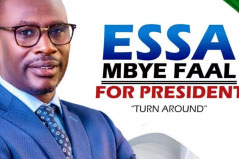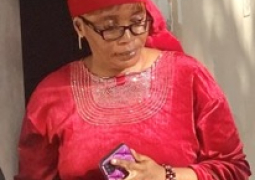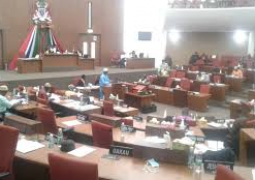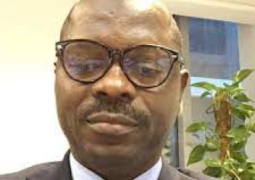
Mr. Fall reiterated that he is running for president for ‘our beloved Gambia’ because the country is standing at a cross roads and regressing while people continue to suffer the indignities of poverty.
Addressing journalists on Wednesday during the unveiling of his ambitious blueprint, Faal, who is the only independent candidate contesting in the 2021 presidential election, brings to the fore key priority sectors that are critical in the country socio-economic development.
“For a positive transformation of our beloved country, we need competent heads, able hands, appropriate tools and abundance of result-oriented Gambians supported by a leadership with ideas to turn around the country to prosperity for all. This diligent approach will enable us to adeptly implement tired and tested best practices, as well as new appropriate innovation.”
The Gambia, he added, is not in need of yet another long and convoluted policy document, saying ‘we have many of these.
“Our country is in need of an Action Plan, a blueprint for development. Team Essa Mbye Faal offers The Gambia a practical Action Plan for National Turn Around. In its honesty, simplicity and ambition, every Gambia can play a practical role in our Acton Plan for National Turn Around, whilst equally delivering a framework by which to hold to account, the presidency of Essa Mbye Faal.”
According to him, his first 100 days in office will witness ultra-ambitious and hyperactive in its work and pursuit of inclusive, responsible and sustainable development.
“The first 100 days in office will set the tone, pace and work ethic for the presidency. We will listen to all political parties, stakeholders and development partners on specific programme, project and activities, but ‘we shall start by implementing a portfolio of activities, to pave the way for the transformative National Turn Around.”
Fighting Endemic Corruption
On corruption, Faal expressed his resolve to fight endemic corruption, saying the menace has disproportionate impact on the poor and the most vulnerable, increasing costs and reducing access to services including health, education and justice.
“We will eliminate waste and ensure that Gambia is free of corruption and graft, a goal long desired by people”
Economy
Faal said his government would create a functional, participatory and efficient economy for ‘our times based on sustainable growth and macro-economic stability; eliminate waste and introduce cutbacks in government spending, privatisation of state-owned enterprises, increase foreign trade and remove barriers to trade, liberalistion of interest and exchange rates.
Elevate Education Standards
He outlined that he would work towards improving the quality and relevance of education in The Gambia by strengthening national capacity to address challenges of teaching and learning, including teacher-related challenges.
“Access to early childhood education and development programmes, especially for children from disadvantaged background, to help reduce education inequality and to ensure that all children begin formal schooling on a strong foundation.”
Infrastructure transformation
According to him, a recent World Bank study found the poor state of infrastructure in many African countries including The Gambia, reduces national economic growth by 2 percentage points every year and cut business productivity by as much as 40%, making Africa in spite of its enormous mineral and other natural resources- the region with the lowest productivity levels in the world. “I will create a network of infrastructure to help move The Gambia into the 21th century and boost our country’s economic growth.”
Youth Orientation Programmes
Faal also spoke highly of the plans he laid for youth empowerment, saying youth represent about 37% of the population of The Gambia and hence hold the key to Gambia’s economic, political and social transformation if we are to become a Middle–Income country. “Our commitment is to systematically transform our young people into active, dedicated and productive citizens.”
Fall laid similar ambitious plans for the other area such as; promoting the country’s Agriculture Sector, Reviving the Health Sector, ICT and Women Empowerment, Security Sector, Public Service Reforms, Diaspora Engagement and Environmental Protection.




